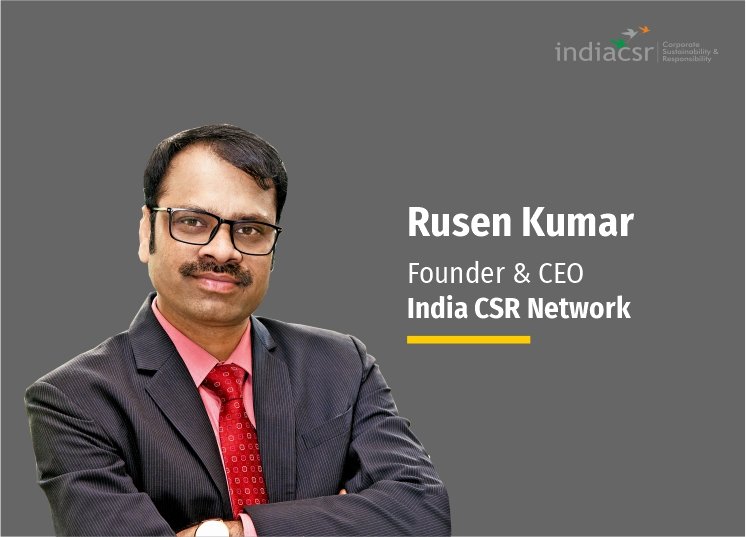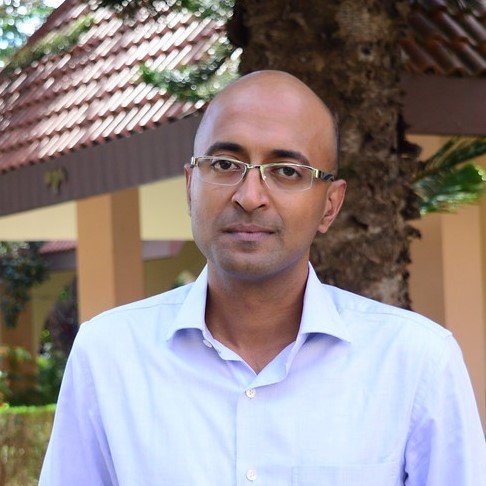Murugan Vasudevan, CEO, Veddis Foundation talked to Rusen Kumar, Editor, India CSR on how Veddis is working at the intersection of technology, policy, and impact. “By taking an evidence-based approach to supporting institutions doing radical work, Veddis hopes to bring analytical rigour and a collaborative spirit to philanthropic investments, to also achieve measurable outsized impact.”, says Murugan.
With a mission to create deep and irreversible social change, Veddis works directly with the government on effective public service delivery. Since Veddis began their journey in 2006, they have worked directly with multiple state governments and invested in over 100 organisations, representing some of the most innovative initiatives in the social sector. Excerpts of an Interview:
What was the inspiration behind Veddis Foundation and how has the journey been so far?
We began our journey as Letz Dream Foundation in 2006 with a focus on grant-making and supporting exceptional organisations implementing impactful large-scale projects. We wanted to bring analytical rigour and a venture mindset into grant-making. Whether it is the selection of organisations to partner with or what strategies are most likely to yield the best outcome, we take a data-driven approach. We look for clear evidence of the organisation’s impact, the cost-effectiveness of the solution and its scalability.
Initially, the primary activity of the Foundation was providing funding support to worthy non-profit organisations covering a wide variety of social causes. In 2014, we adopted a hands-on approach and began to work directly on implementation through our field teams. Our first such project was working on the Model Gram Panchayat project in Ratakhurd, a village in the Alwar district of Rajasthan to create sustainable livelihoods and raise the quality of life and governance. We implemented a variety of successful initiatives including improved agricultural practices, skilling exercises and healthcare/nutrition interventions.
We also understood that there was a need to complement ‘wholesale giving’ in India with a culture of ‘retail giving’. We incubated and supported the development of ‘Letz Change’, an innovative retail giving platform. Letz Change enabled non-profit organisations to present their work credibly, get positive reviews from those who have seen their work, and tap into their social networks to raise funds. In 2018, Letz Change merged with GiveIndia to become India’s largest and most trusted giving platform.
Our learnings from Ratakhurd and Letz Change have deeply shaped our thinking and guided our core philosophies. We recognise the value of both government and technology as agents of scale. We believe that any efforts to reduce poverty require a multi-sector, multi-pronged, collaborative approach that can address its many manifestations and root causes. We work with organisations operating across sectors such as education, healthcare and agriculture, and closely track multiple impact metrics in intervention areas.
Tell me about the different programs and initiatives under The Veddis Foundation?
We have three focus areas, the first is the Grants programme where we provide multi-year, unrestricted funding to non-profit organisations. The Social Impact Fund that was launched as part of our recent 100 cr commitment will be the primary vehicle for our grants going forward.
Our second is Policy Action where we work directly with state governments to improve the performance of State Livelihood Rural Missions (SRLMs). Beginning with a 2-year partnership with the Rajasthan Government in 2016, we helped improve the implementation of the Rajasthan Grameen Aajeevika Vikas Parishad in 10 districts. The pilot has subsequently been expanded across the entire state.
We have since partnered with the Government of Haryana to improve their State Rural Livelihood Mission and recently signed an MoU with the Himachal Pradesh State Rural Livelihood Mission.
The third is an extension of our work with governments where we work ‘upstream’ on evidence-led governance, policy design, research and innovations. In the course of helping state governments implement their SRLMs we realised that we could drive leveraged impact by helping governments with policy design. We have recently partnered with IDinsight to work alongside the Delhi Government to set up and run an Outcomes Budget Unit.
What are some of the key partnerships, collaborative initiatives and large-scale impacts achieved by the foundation?
GATI [गति] (Governance for policy Action, Transformation and Innovation) is our initiative under the Policy Action vertical to help state governments improve their SRLMs. Key components of these partnerships include capacity building of critical institutions under the National Rural Livelihood Mission (NRLM) like Self Help Groups, Village Organisations and Cluster Level Federations, as well as livelihood interventions, market linkages and skill development. We realised that making a small intervention into a project like the NRLM can allow us to unlock outcomes made possible by government budgets. For example, we were able to improve the livelihoods of over 80,000 rural families in Haryana and achieve a 50% increase in income for 1,60,000 households in 10 districts of Rajasthan with a relatively small investment.
We also currently support three non-profit organisations through our Grants Programme. The Society for Public Education Cultural Training and Rural Action (SPECTRA) is one such organisation that works on community development and women empowerment. We began our relationship with SPECTRA in 2013 when working in Rathakurd, Alwar in Rajasthan. Since then, average household incomes have increased by 365% while 92% of children have normal BMIs and only 7.2% of girls are anaemic (compared to 4.5% children and 80% of girls before). The intervention has now been scaled to 8,500 households across 6 Gram Panchayats, by deploying the ‘Graduation Approach’ to target the most vulnerable households within communities.
The second organisation is the RightWalk Foundation who is the state-level PMU for the implementation of the recent Apprenticeship Scheme in Uttar Pradesh. The programme aims to directly connect disadvantaged and unskilled/semi-skilled youth to industries. By adopting a holistic push-and-pull approach, RightWalk will enlist over 5,000-10,000 companies who will engage with 40,000-50,000 trade apprentices.
Finally, there is the Swaniti Initiative, whose goal is to supplement the planning capacity of various departments in the Andhra Pradesh government. They do this by providing a mix of problem-solving tools, data & research insights, and advisory services. The primary goal of Swaniti is to increase access and inclusion for extremely vulnerable populations by implementing a bottom-up planning system across government departments.
What is the long-term vision of Veddis? How do you plan to extend your initiatives?
We will continue to provide unrestricted funding to organisations that operate at the intersection of policy, technology, and can demonstrate evidence of impact. Bringing a data-driven and analytical approach to philanthropy is a core philosophy of Veddis. Our work with government departments to improve policy implementation for critical projects like rural livelihood schemes will remain a priority for us. The realisation that partnering with governments is the most leveraged way to scale impact continues to influence our plans for the future.
What are some of the new initiatives and projects in the pipeline?
We have recently committed a corpus of Rs. 100 crore over three years to accelerate large-scale social impact. The first initiative under this commitment is the Social Impact Fund (SIF) where we will provide grant capital to non-profit organisations working at the intersection of technology, policy and impact. It is apparent to us that the size of the task at hand can’t be achieved alone – any issue in any given sector is likely to be the result of a complex confluence of factors. The SIF enables us to accelerate and expand our grants programme by offering multi-year unrestricted grant capital of up to Rs. 1 crore per year to organisations.
We expect to invest significantly in driving more evidence-led governance and policy design. We believe that helping improve government policies at the conception stage will allow us to scale our impact by orders of magnitude.
We are also looking to expand the GATI (Governance for policy Action, Transformation and Innovation) initiative where we aid state governments in their implementation of the NRLM. We recently signed an MoU with the Himachal Pradesh State Rural Livelihood Mission to support the livelihoods of 50,000 rural households across 5 districts and have expanded our engagement in Haryana to cover 4 additional districts.

About the Author
Rusen Kumar is the founder and managing editor of India CSR – The CSR Informer of India. He writes on CSR, Sustainability and Environmental affairs. He brings an understanding of governance, leadership development, social development, human development, and strategic focus by serving for-profit and not-for-profit boards and as an advisor to chief executive officers and executive management members. His leadership accomplishments in social enterprise, planning, and governance range from viable achievements in knowledge forum initiatives to advancement of corporate social responsibility issues in India. Read more about Rusen Kumar
(India CSR)





